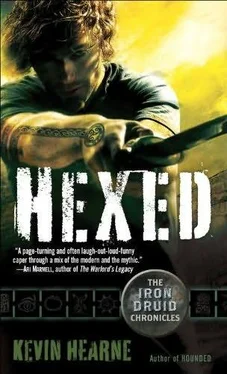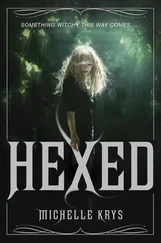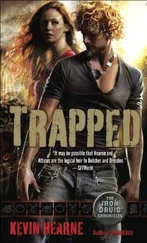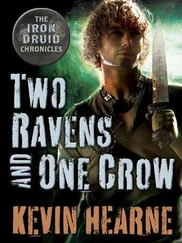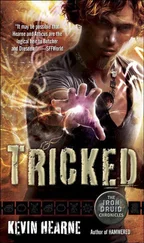“You think someone’s going to attack me?”
“No, no, it’s a precaution only. Now get inside and close the door—shoo. But open up the shop for me tomorrow; I won’t be in ’til after lunch.”
“All right,” she said uncertainly. She turned, and I looked at the ceiling so that my peripheral vision would not drag my focus downward. “I guess I’ll see you tomorrow, then.”
“Sleep well,” I said as the door closed, shutting that body away from my eyes, and I sighed in relief. “Damn, I need a cigarette after that. And I don’t even smoke.”
Druid’s Log, November 1: Buy attractive apprentice some shapeless, ugly clothes as soon as possible; maybe convince her to shave her head as well. Tell her all the cool Druid initiates are doing it.
I didn’t need to put a ward on Granuaile’s door, since I had placed one there a week ago without telling her, right after she returned from North Carolina and confirmed she still wanted to be an initiate.
After taking a couple of deep breaths to regain my composure and focus on my purpose, I used the stairwell to head up to the witches’ floor. I had no illusions that I would catch them unawares; they probably knew the moment I’d entered the building, much less ascended the stairs to their floor. I took a moment to mutter a binding on all my hair and skin, to make sure none of it escaped to fall into the hands of a witch. I had to be careful with my magic usage here; nine floors up from the earth, I had a limited supply of energy upon which to draw, just what was stored in my bear charm. I can’t really sling magic around the way witches can, in any case. In a situation like this, my sword would serve me better. Fragarach (the Answerer in Irish) wasn’t simply a sharpened piece of steel: The Tuatha Dé Danann had given it a couple of bonus utilities when they forged it ages ago, and I intended to employ one of them now.
I drew it from its scabbard, thereby breaking a state law or two about deadly weapons, and opened the door to the ninth floor. The hallway was clear and uncomfortably silent, the lights dimmer somehow, and the air close and quiet like the dark, stuffy space underneath a blanket. On the other floors, where trust-fund college kids and young professionals lived, you could hear muted music and laughing and The Daily Show ’s mockery through the doors. The witches were having none of that.
“It’s Atticus,” I called as I rapped my knuckles on Malina’s door. The percussive sound seemed to offend the hallway’s sense of decorum, and the quiet chastised me as it dropped into my ears like cotton balls. I stood presenting my left side to the fish-eye peephole, so that my sword arm was hidden from view.
While I waited for her to answer, I thought of how stupid I was being right then. Oberon’s words rang in my ears, along with the shrill voice of paranoia in my head. Meeting the witches on their own turf without a nonaggression treaty and without support of any kind was really asking for it. I still didn’t know quite what they were capable of; if Malina was to be believed, they had held this territory against all comers for nearly thirty years. The threshold could be booby-trapped or enchanted. I could be walking into a cage fight with a demon. Hell, she could open the door with a Glock 9 in her hand and put a bullet in my ear, or throw a cat at me, or call me a damn hippie.
She did none of those things. I heard the locks tumbling open—regular, everyday locks—and then she stood before me with red-rimmed, puffy eyes and said, “Waclawa’s dead.”
It took me a moment to process that she’d said someone’s name. I know forty-two languages—many of them extinct now—but Polish isn’t one of them, and in general I’m not that great with the Slavic tongues. Waclawa, I recalled, was one of the names on the list of Malina’s coven members.
“I’m sorry,” I said. “How did she die?”
“The police will probably call it spontaneous combustion,” she ground out bitterly, “but there was nothing spontaneous about it.” Malina wore a diaphanous purple tunic over a white camisole. She had on a black skirt that fell to her knees and hugged her hips; her legs were sheathed in black tights, and she wore pointy high-heeled ankle boots of jet suede. Her lips were painted a soft pink, and now they were pressed together in regret. I marveled again at her hair—gentle waves of blond silk that one simply never sees except on silver screens, framing her face and spilling down past her collarbone. Normally her skin was white and smooth as marble, inviting caress, but now it was flushed and blotchy because she was upset. She opened the door farther and gestured. “Come on in.”
I didn’t move. “Forgive me, but I need two questions answered first.” I moved my sword into view but did not raise it or threaten her with it. “Will you answer?”
Malina’s eyes flicked down. “If I answer incorrectly, then I get the sword?”
“No, the sword makes sure you answer correctly. It’s kind of special that way.”
Malina narrowed her eyes. “What sort of questions?”
“Nothing about your coven’s secrets, nothing personal. They regard my immediate safety only.”
“Do I get a quid pro quo?”
I sighed. Everything with this witch was a negotiation. “I freely tell you I have no intention of attacking you without being attacked first.”
“I already knew that. I want to know about your magic.”
“No, that is not a quid pro quo.” I shook my head. “The value is not the same.”
Malina raised her eyebrows. “You are suggesting that innocent questions about your magical abilities are more important than questions of your immediate safety?”
“Of course, for the answer to the latter will do me no good past this evening, and the former will inform you forever.”
“I am too upset to enjoy fencing with you about this. Ask your questions about personal safety.”
I raised Fragarach slowly, deliberately, and pointed it at Malina’s throat. “Freagróidh tú,” I said in Irish, and Fragarach turned cold in my hand, its blade gleaming blue and enveloping Malina’s head in a soft cloud of cyan light. The witch blinked.
“The sword can cast a spell?” she said. “Most unusual. Was this the reason Aenghus Óg wanted the sword so much?” I was sure it was one of the reasons, but the true answer had more to do with Fae politics and a personal vendetta against me. I had not come to discuss my sword’s magical capabilities.
“I’ll ask the questions,” I replied. “Did you have anything to do with the attempt on my life tonight, or do you have any knowledge of who might have been involved?”
“I personally had nothing to do with it, nor did any from my coven, but I do have knowledge of who might have been involved.”
The temptation to ask “Who?” was nearly overwhelming, but I bit it back; it could wait, and I only had one question left. I carefully composed it, then asked, “Do you, or any other person, creature, or spirit within your home, intend to cast any spell on me while in the building, or are there enchantments that I may unknowingly trigger during my visit?”
“Neither I nor any other person, creature, or spirit in my home intends to cast a spell on you. I do not wish to tell you about our enchantments, for I feel that intrudes uncomfortably into the area of coven secrets, which you promised not to explore.…” Malina frowned for a moment and then continued, her eyes widening as she realized she could not stop herself. “But of course you tripped an enchantment the moment you walked into the building, as all nonresidents do—a simple low-level alert. And another that identified you as carrying a magical item. And then another in the hallway that— Zorya Vechernyaya, zamknij mi usta! ”
Читать дальше
